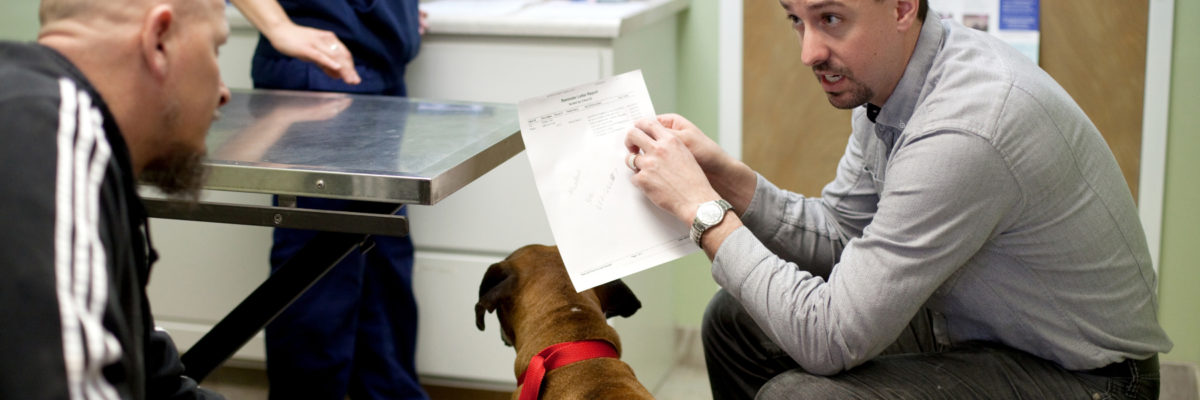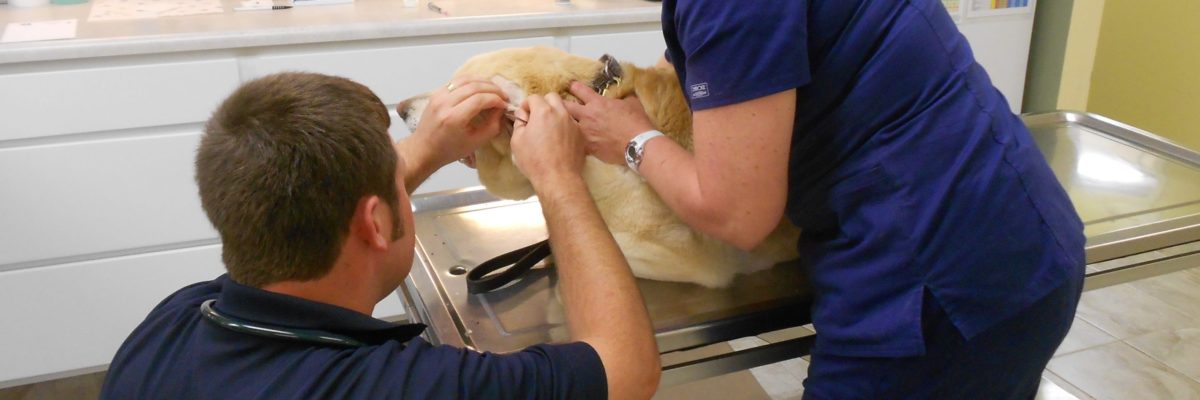Preventive healthcare involves a multi-faceted approach that includes veterinary evaluation of your pet’s overall health and risks of disease or other health problems. Based on the findings, your veterinarian will provide you with recommendations for your pet’s nutrition, dental care, vaccinations and heartworm/flea/tick prevention, as well as recommendations specifically tailored to your pet’s health status and risk factors.
As with dental care, taking care of your pet’s eyes is important for his or her well-being. At Meadowbrook Veterinary Clinic our veterinarians are skilled and experienced in diagnosing and treating many problems. We make eye examinations part of routine check-ups.
If needed, we will refer some cases to animal eye care specialists. We want to be sure your pet gets the best possible care.
Some of the most common eye ailments in dogs and cats are cataracts and glaucoma. We also see a lot of dry eyes and scratched corneas. Eyelid problems also are fairly common.
Some of the things pet owners need to look for when doing home exams are:
- Your pet’s eyes should be bright and clear and the area around the eyeball should be white. Pupils should be equal in size.
- Tearing, discharge or crust in the corners of the eyes could indicate a problem.
- The lining of the lower eyelid should be pink, not red or white.
- There should not be any cloudiness in the eyes or a change in color.
- Bulging of the eye, which can indicate injury.
- A visible third eyelid.
Pet owners should take a closer look if the animal’s eyes get watery on a frequent basis or if Fido starts pawing at his eyes as if irritated. Eye injuries in pets are not all that uncommon. Nor are chronic problems.
If you spot any of these problems or have other concerns about your pet’s eyes, bring him or her to Meadowbrook Veterinary Clinic. We will do a full eye examination to rule out some problems and figure out what is going on.
Good dental care is very important to the overall health of dogs and cats. That’s not something a lot of people think about, but it’s true.
At Meadowbrook Veterinary Clinic we take dental care for pets very seriously because bad teeth can lead to a host of other problems, including systemic disease and even heart conditions.
The same high-quality dental work that you get for your teeth can be done at our hospital – on your pet’s teeth. We do ultrasonic teeth cleaning and polishing. We treat periodontal disease. We do digital dental x-rays and we even do extractions.
We highly recommend annual checkups and cleaning on your pet’s teeth. But in the meantime there are some things you should watch for that may indicate a tooth problem. They include:
- Bad breath
- Broken or loose teeth
- Discolored teeth
- Abnormal chewing, drooling or dropping food from the mouth
- Reduced appetite or refusal to eat
- Bleeding from the mouth
With our dental cleanings, each patient receives a thorough preoperative examination prior to any sedation. All pets over the age of 7 years old are required to have pre-anesthetic blood work within 30 days of anesthesia to ensure their safety. All pets under the age of 7 years old have the option for preanesthetic blood work. Each procedure at Meadowbrook Veterinary Clinic is performed under an individualized anesthetic plan and one of our certified and skilled veterinary technicians will monitor your pet before, during and after the procedure. All patients receive an IV catheter with fluid therapy and are hooked up to full anesthetic monitoring. We ensure all pets are given medications to alleviate pain and nausea associated with anesthesia.
Each pet will receive full mouth digital x-rays to allow our veterinarians to see the health of each tooth under the gumline. The veterinary technician will then individually scale and polish each tooth before the doctor performs a full intraoral exam. Based upon the x-ray findings and their exam, the veterinarian will make recommendations such as an extraction or referral for a root canal.
After treatment Meadowbrook veterinarians will work with you on a continuing treatment plan, including how to brush your pet’s teeth, and recommend products that promote good dental care for animals.
What are vaccines, and why do they matter?
Vaccines are products designed to trigger protective immune responses and prepare the immune system to fight future infections from disease-causing agents. Vaccines stimulate the immune system’s production of antibodies that identify and destroy disease-causing organisms that enter the body.
Vaccines provide immunity against one or several diseases that can lessen the severity or prevent certain diseases altogether.
Experts agree that widespread use of vaccinations within the last century has prevented death and disease in millions of animals. Vaccinations protect your pet from highly contagious and deadly diseases and improve your pet’s overall quality of life.
5 reasons to vaccinate your pet
- Vaccinations prevent many pet illnesses.
- Vaccinations can help avoid costly treatments for diseases that can be prevented.
- Vaccinations prevent diseases that can be passed between animals and also from animals to people.
- Diseases prevalent in wildlife, such as rabies and distemper, can infect unvaccinated pets.
- In many areas, local or state ordinances require certain vaccinations of household pets.
Do vaccinations ensure protection?
For most pets, vaccination is effective in preventing future disease or decreasing the severity clinical signs. It is important to follow the vaccination schedule provided by your veterinarian to reduce the possibility of a gap in protection.
Why do puppies and kittens require a series of vaccinations?
Very young animals are highly susceptible to infectious disease because their immune system is not yet fully mature. They receive protection through antibodies in their mother’s milk, but the protection is not long-lasting and there may be gaps in protection as the milk antibodies decrease and their immune system is still maturing. Maternal antibodies can also interfere with a puppy’s or kitten’s vaccine response, so a series of vaccines is typically recommended to ensure that the puppy or kitten receives a vaccine as early as possible after maternal antibodies subside.
In many instances, the first dose of a vaccine serves to prime the animal’s immune system against the virus or bacteria while subsequent doses help further stimulate the immune system to produce the important antibodies needed for long-term protection.
Finish the series
An incomplete series of vaccinations may lead to incomplete protection, making puppies and kittens vulnerable to infection.
To provide optimal protection against disease in the first few months of life, a series of vaccinations are scheduled, usually 3-4 weeks apart. For most puppies and kittens, the final vaccination in the series is administered at about 4 months of age; however, a veterinarian may alter the schedule based on an individual animal’s risk factors.
Which vaccinations should my pet receive?
“Core” vaccines are recommended for most pets in a particular area or geographical location because they protect from diseases most common in that area. “Non-core” vaccinations are for individual pets with unique needs. Your veterinarian will consider your pet’s risk of exposure to a variety of preventable diseases in order to customize a vaccination program for optimal protection throughout your pet’s life.
Talk with your veterinarian about your pet’s lifestyle, including any expected travel to other geographical locations and/or contact with other pets or wild animals, since these factors impact your pet’s risk of exposure to certain diseases.
How often will my pet need to be vaccinated?
Many vaccinations provide adequate immunity when administered every few years, while others require more frequent schedules to maintain an acceptable level of immunity that will continually protect your pet. Your veterinarian will determine a vaccination schedule that’s appropriate for your pet.
Do vaccinations have side effects?
It is common for pets to experience some or all of the following mild side effects after receiving a vaccine, usually starting within hours of the vaccination. If these side effects last for more than a day or two, or cause your pet significant discomfort, it is important for you to contact your veterinarian:
- Discomfort and local swelling at the vaccination site
- Mild fever
- Decreased appetite and activity
- Sneezing, mild coughing, “snotty nose” or other respiratory signs may occur 2-5 days after your pet receives an intranasal vaccine
More serious, but less common side effects, such as allergic reactions, may occur within minutes to hours after vaccination. These reactions can be life-threatening and are medical emergencies. Seek veterinary care immediately if any of these signs develop:
- Persistent vomiting or diarrhea
- Itchy skin that may seem bumpy (“hives”)
- Swelling of the muzzle and around the face, neck, or eyes
- Severe coughing or difficulty breathing
- Collapse
- A small, firm swelling under the skin may develop at the site of a recent vaccination. It should start to disappear within a couple weeks. If it persists more than three weeks, or seems to be getting larger, you should contact your veterinarian.
Always inform your veterinarian if your pet has had prior reactions to any vaccine or medication. If in doubt, wait for 30-60 minutes following vaccination before taking your pet home.
What our customers say...

As a new patient, these folks went above and beyond to get my girl, Isis, in real quick and put my worst fears at ease. Everyone was very professional and took great care of both Isis and myself. I would recommend the Meadowbrook Team to everyone. Good vibes here! Your thoroughness and making sure I understood everything that was going on, is what I liked most about my visit!
Darcy B.

I’ve been a Meadowbrook customer for 30 yrs. the staff are always friendly and professional. Not one complaint. You can trust that your pet is being treated with love and care.

This clinic is amazing. I have taken my pets here for many years and they have treated them for everything from yearly exams to emergencies. The doctors and staff are always accommodating to our pets needs and show them compassion. I would recommend this clinic to anyone and feel that our pets have always gotten very good care here.
Bethany W.

We’ve been going here for years. The staff is all super friendly and helpful! You can tell that they truly care about every animal that walks through the door.
Jenna L.

Dr. G and Dr. W have been amazing and instrumental in getting Penny healthy. She is thriving and so very happy!!

